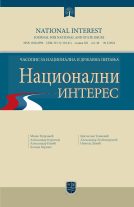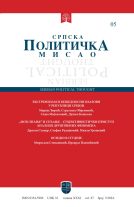- Home page
- Researchers
- Uroš V. Šuvaković
Uroš V. Šuvaković
Filozofski fakultet, Katedra za sociologiju, Univerzitet u Prištini sa privremenim sedištem u Kosovskoj Mitrovici

RELIGIOUS EDUCATION IN SERBIA TWO DECADES AFTER ITS INTRODUCTION IN THE SCHOOL SYSTEM: OPINIONS OF STUDENTS AND THEIR ATTITUDES ON RELATED ISSUES
In the course of more than two decades since the introduction of Religious Education into the Serbian school system, there has been a scientific and social need to check the attitudes of current students regarding its status, the applied model and the impact of attending Religious Education on the formation of attitudes on certain social issues, about which churches and religious communities have their own doctrinal positions. The research, carried out by the online survey technique, on a snowball sample, was carried out during May and June 2022, among students of all faculties of education in Serbia. The choice of faculty of education students as a statistical group is related to the fact that teachers are the ones who first meet students as part of school socialization and significantly influence the formation of their social attitudes in the early period of institutional socialization. Therefore, it was important to check their views on this matter.
The most important findings show that the absolute majority of students believe that Religious Education should become a compulsory subject through primary schooling, but that the applied model should be modified in terms of content. The students are of the opinion that at the age when the key socialization of the personality is carried out (the first four grades of primary school, pupils aged 7-11), religious teaching should be organized according to the confessional model, in the students' faith, as is the case now, while in the other four grades (from the fifth to the eighth, pupils aged 11-15) primary school, it should be organized on non-confessional principles, which would enable the knowledge of scientific views on religion, as well as knowledge of the views of the world of other religions, as well as consideration of religion in the key of an important social phenomenon (historical, philosophical, moral, sociological, etc.).
An important finding is confirmation of the position that the choice between these two subjects (Religious Education and Civic Education) influences the formation of students' social attitudes regarding certain social issues, on which churches and religious communities have their own clear viewpoints, which can also explain their unity, independent of religion and confession, regarding the existence of religious teaching in the educational system of Serbia. It should be noted that, through the introduction of Religious Education into the school system, especially through the confessional model, the functions of the church (that is, religious communities) and the school as „state ideological apparatuses” (Althusser) actually came into symbiosis. The school „assists” the church in the performance of one of the functions that should be exclusively church – religious instruction according to a certain catechism, and this need can be understood through the ritual dimension of religiosity widespread among the most numerous Orthodox believers in Serbia, while the other dimensions of religiosity are more or less neglected or certainly less present.
The research confirmed the impact of attending religious classes on the formation of certain social attitudes among respondents, so from that aspect, the perseverance of churches and religious communities to maintain it in the school system should be observed, according to the confessional model.

COVID-19 PANDEMIC AND GLOBAL CAPITALISM
The paper points to social effects produced by the COVID-19 pandemic. They are of such importance that they have largely changed the people’s life on the planet, leading to the deepening social stratification, substantially affecting geopolitical relations in the modern world, and even questioning science as a form of human knowledge of the world and its authority, which could not be imagined ever since the appearance of rationalism.
The starting assumption is that the COVID-19 pandemic is a direct consequence of the hyper-accelerated globalization process, which actually enabled it to cause huge social changes in the whole world in a short period. Global capitalism, based on neoliberalism (globalism) as its ideological foundation, is an ideal environment not only for the expansion of the pandemic caused by the newly discovered SARS-CoV2 virus, but also for causing a whole series of social consequences. However, all these consequences and the great number of occurring changes has not (yet) caused any change in the system. Global capitalism continues to fulfil its basic function: increasing the profit of the richest. People are still less important than making increasing profits, whereas it is evident that certain sectors of economy have enormously increased their profits, while others have reduced it. We do not believe that every time capitalism should be given a new name or an adjective denoting a new “distinction”. Capitalism is undergoing its global stage and it is of technological nature how its system goals are achieved. All those are moments in the development of the capitalist system, while pandemics also characterized earlier stages of capitalism (and other socio-economic formations), but they did not spread at this speed.
All this requires significant engagement of social sciences in the research of the COVID-19 pandemic, particularly from the sociological aspect, and therefore the establishment of a new sociological discipline – COVID-19 sociology.

FAMILY THROUGH PROGRAM POSITIONS OF THE POLITICAL PARTIES IN SERBIA: AN OVERVIEW OF THE SECOND DECADE OF THE 21ST CENTURY
Practically all parties in Serbia opt for a pro-birthrate policy, whereas some of them do it although there is a positive birthrate in the area of their acting (e.g. Muslim parties in the region of Raška). This is also understandable since Serbia is faced with a prominent crisis of population growth that has been negative for as many as 29 consecutive years. The paper gives an overview and analyzes the program positions of the most influential parties in Serbia regarding family, parenthood, and family and population policies. Similarities and differences are indicated in the affiliations of the parties towards these matters and there is an attempt to classify them based on their positions to family, parenthood and birth. If the woman’s freedom to decide about having children is taken as the modernity criterion, the most conservative positions are certainly taken by the Justice and Reconciliation Party and the Party of Democratic Action of Sandžak which believe that the woman’s social status is related to the number of her children, whereas other parties as the subject of the analysis range within the framework of modern perceptions regarding the creation of the population policy. The situation is similar when it comes to family policy. All parties treat family as a traditional place for looking after children, without perceiving the data that in Serbia in 2017 every fourth child was born out of wedlock. Some of the parties see the only function of the family in having children and their upbringing – with the role of woman/mother particularly emphasized – while others appreciate the need of woman/mother and man/father equally expressing themselves both in their family and career fields, so they advocate so-called “two-breadwinner families”. The majority of the parties have elaborate plans for encouraging the creation and maintenance of families, particularly when it comes to young married couples. The programs of serious parties are fully detailed (the Progressive Party, the Socialist Party), including the position towards single-parent families as well, whereas others are less detailed and rather represent the drafts of population and family policies (United Serbia, Đilas’s Party of Freedom and Justice). The measures recommended by the parties are quite similar and involve the redistribution of the national income in favour of families, particular care for special family categories, harmonization of work and parenthood, encouraging childbirth through various forms of benefits both at the state level and the local self-government level. Except for the Socialist Party which does not have an explicit position but mentions the promotion of the rights of LGBT population, consequentially referring to the rights in the domain of family policy, other parties by default see family as a union of a man, a woman and their children. Moreover, the Socialist Party is also the only one taking into account the extramarital union as an alternative family form. Having in mind their position towards family and population policies, and based on their program positions regarding these matters, we recommend the following classification of the political parties whose programs have been considered: a) postmodern - the Socialist Party; b) modern - the Progressive Party, the Social Democratic Party, the Democratic Party; c) populist - United Serbia; d) pragmatic – the Party of Freedom and Justice, the Alliance of Vojvodina Hungarians; e) traditional – Serbian Patriotic Alliance; and f) conservative - Justice and Reconciliation Party, the Party of Democratic Action of Sandžak

Orientation towards EU Integration and Existence of Euroidentity – Serbian Students Attitudes
This paper is based on the empirical research conducted among students in Serbia, at two universities: University of Belgrade and University in Priština with the temporary seat in Kosovska Mitrovica. Results obtained show that the issue of EU accession and the feeling of European identity are not one and the same thing. While students show a closely pro-European orientation, the percentage of accession support varies due to the influence of various factors (developments in Kosovo and Metohija, various statements by EU officials that are perceived as conditionalities for Serbia). However, when asked if they had some supranational identification, i.e. if they felt like Europeans, a small number of them identified themselves as such. This finding on the absence of a European identity combined with a positive orientation regarding the accession to the EU affirms Brzezinski’s thesis from his interview with D. Rothkopf (July 2014) that the “EU then turned out to be, in the end, essentially a distributed arrangement in Brussels involving money and quid pro quos, but very little sense of common purpose”.

The Value of Patriotism for Students in Russia and Serbia
Results of the survey regarding the relation of students with reference to the values of patriotism in Moscow, Belgrade and partly in Kosovska Mitrovica are comparatively presented in the paper. The technique of questionnaire was applied in the survey, in Moscow on random and in Belgrade on two-stage, quota sample, while the instrument was the same. The survey on student population was also performed in Kosovska Mitrovica, but by another instrument application, so that conclusions on students' patriotism might be indirect. The results of the survey in both countries show that more than the half of students declare themselves as patriots, while this percentage grows with Serbian students when the patriotism is concretized (e.g. the relation regarding Kosovo). It is noticeable that Russian students in the first place show patriotic pride regarding the heroic history of their country, while Serbian students put in the first place deideologized values – natural beauties.
